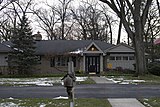Minimal Traditional is a style of architecture that emerged in mid 20th century America as a vernacular form that incorporates influences from earlier styles such as American Colonial, Colonial Revival, Spanish Revival, Tudor Revival, and American Craftsman while adhering to modern architecture's avoidance of ornament. [1] [2]
The Minimal Traditional style evolved during the 1930s and was a dominant style in domestic architecture until the Ranch-style house emerged in the early 1950s. [1] [2] Descending in part from the bungalows, cottages, and foursquare houses of the early 20th century, Minimal Traditional houses represent a "stripped-down version of the historic-eclectic styles popular in the 1920s". [3] They are usually detached single-family houses that are on the smaller side and retain simplified versions of the built-in cabinets that were popular features of the Craftsman era. [1] [4] Typical features include hipped or gabled roofs without much in the way of eaves; cladding in locally popular materials such as wood, brick or stone; small porches; and an asymmetrical design with the front door set off center. [1]
The Minimal Traditional house "fulfilled aesthetic and social needs for affordable single-family housing" and was used by the Federal Housing Administration as a prototype for a "minimum house that the majority of American wage earners could afford". [3]
Minimal Traditional houses have been tagged with some other names: FHA house, Depression-era cottage, Victory cottage, and American small house. [4]
-
Bloomington, Indiana, house built in 1931 in the Minimal Traditional style.
-
Knoxville, Tennessee, house built in 1932 in the Minimal Traditional style.
-
Knoxville, Tennessee, house built in 1939 in the Minimal Traditional style.
-
Bloomington, Indiana, house built in 1940 in the Minimal Traditional style.
-
Toledo, Ohio, house built in 1961 in the Minimal Traditional style.
See also
References
- ^ a b c d "Minimal Traditional Architecture". Antique Home website.
- ^ a b Baker, John Milnes. American House Styles: A Concise Guide.
- ^ a b Gibbs, Jocelyn, et al., eds. Outside In: The Architecture of Smith and Williams. p. 174.
- ^ a b "American Small House" [usurped]. Georgia Department of Natural Resources, Historic Preservation Division. (Slideshow/PDF.)
Minimal Traditional is a style of architecture that emerged in mid 20th century America as a vernacular form that incorporates influences from earlier styles such as American Colonial, Colonial Revival, Spanish Revival, Tudor Revival, and American Craftsman while adhering to modern architecture's avoidance of ornament. [1] [2]
The Minimal Traditional style evolved during the 1930s and was a dominant style in domestic architecture until the Ranch-style house emerged in the early 1950s. [1] [2] Descending in part from the bungalows, cottages, and foursquare houses of the early 20th century, Minimal Traditional houses represent a "stripped-down version of the historic-eclectic styles popular in the 1920s". [3] They are usually detached single-family houses that are on the smaller side and retain simplified versions of the built-in cabinets that were popular features of the Craftsman era. [1] [4] Typical features include hipped or gabled roofs without much in the way of eaves; cladding in locally popular materials such as wood, brick or stone; small porches; and an asymmetrical design with the front door set off center. [1]
The Minimal Traditional house "fulfilled aesthetic and social needs for affordable single-family housing" and was used by the Federal Housing Administration as a prototype for a "minimum house that the majority of American wage earners could afford". [3]
Minimal Traditional houses have been tagged with some other names: FHA house, Depression-era cottage, Victory cottage, and American small house. [4]
-
Bloomington, Indiana, house built in 1931 in the Minimal Traditional style.
-
Knoxville, Tennessee, house built in 1932 in the Minimal Traditional style.
-
Knoxville, Tennessee, house built in 1939 in the Minimal Traditional style.
-
Bloomington, Indiana, house built in 1940 in the Minimal Traditional style.
-
Toledo, Ohio, house built in 1961 in the Minimal Traditional style.
See also
References
- ^ a b c d "Minimal Traditional Architecture". Antique Home website.
- ^ a b Baker, John Milnes. American House Styles: A Concise Guide.
- ^ a b Gibbs, Jocelyn, et al., eds. Outside In: The Architecture of Smith and Williams. p. 174.
- ^ a b "American Small House" [usurped]. Georgia Department of Natural Resources, Historic Preservation Division. (Slideshow/PDF.)




